This is the third of a massive three part article celebrating the many podcasts I listen to. To read the first part, go here. To read the second part, go here.
 Pitch: Much like Imaginary Worlds, Pitch works the music realm with just the right rigorous touch, never too wonky about its subjects while shining the investigative light in some unexpected corners, such as how to run an independent record label in an age of declining revenue and an audio association that I thought I was the only person in the world to hold: namely, the iPhone notification sound’s close propinquity to the Beach Boys’s “Sloop John B.” But Pitch works very well when it gets into such outlier subjects as a consideration of the “bow chicka wow wow” porn music sound and how a porn composer goes about creating a sonic texture, which is a far more arduous and accomplished task than one might think. (Link)
Pitch: Much like Imaginary Worlds, Pitch works the music realm with just the right rigorous touch, never too wonky about its subjects while shining the investigative light in some unexpected corners, such as how to run an independent record label in an age of declining revenue and an audio association that I thought I was the only person in the world to hold: namely, the iPhone notification sound’s close propinquity to the Beach Boys’s “Sloop John B.” But Pitch works very well when it gets into such outlier subjects as a consideration of the “bow chicka wow wow” porn music sound and how a porn composer goes about creating a sonic texture, which is a far more arduous and accomplished task than one might think. (Link)
 PMACast- A Pretty Much Amazing Podcast: I have no idea if this tremendously useful musical podcast, which has prominently featured rocking indie staples, is permanently defunct or merely resting, but I am including it here in the hope that the producers resuscitate this show on a regular basis, for the clear passion and the fine assiduity that the producers (and guest contributors) put into finding new tracks was a very worthwhile part of my rotation. (Link)
PMACast- A Pretty Much Amazing Podcast: I have no idea if this tremendously useful musical podcast, which has prominently featured rocking indie staples, is permanently defunct or merely resting, but I am including it here in the hope that the producers resuscitate this show on a regular basis, for the clear passion and the fine assiduity that the producers (and guest contributors) put into finding new tracks was a very worthwhile part of my rotation. (Link)
 Psychology of Eating: I am not really a fan of confessional call-in shows, largely because the people who produce these types of affairs tend to be predatory carnival barkers in the way that they respond to a person’s long-standing grief with pat reductionist answers that don’t even begin to chip away at pain’s lifelong hold upon a troubled person. Yet there is something both revealing and bizarre in Marc David’s approach that keeps me coming back. David spends an hour listening to someone — and it always seems to be a woman — coming to terms with her relationship to food and eating and how this has drastically unsettled her life, often her self-esteem, and her image of herself. These subjects are often living very good lives that they cannot seem to see and, through these conversations, we come to understand the insidious role that body image plays on many women, that the way in which these women seem to believe that they must walk the earth without a single ounce of fat on them is a remarkable and needless burden that deserves great consideration until we can inhabit a world that is more equitable in accepting people. (Link)
Psychology of Eating: I am not really a fan of confessional call-in shows, largely because the people who produce these types of affairs tend to be predatory carnival barkers in the way that they respond to a person’s long-standing grief with pat reductionist answers that don’t even begin to chip away at pain’s lifelong hold upon a troubled person. Yet there is something both revealing and bizarre in Marc David’s approach that keeps me coming back. David spends an hour listening to someone — and it always seems to be a woman — coming to terms with her relationship to food and eating and how this has drastically unsettled her life, often her self-esteem, and her image of herself. These subjects are often living very good lives that they cannot seem to see and, through these conversations, we come to understand the insidious role that body image plays on many women, that the way in which these women seem to believe that they must walk the earth without a single ounce of fat on them is a remarkable and needless burden that deserves great consideration until we can inhabit a world that is more equitable in accepting people. (Link)
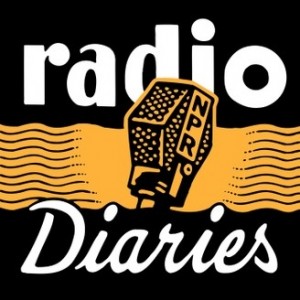 Radio Diaries: It’s hard to believe that this always fresh offering of notable historical figures has been around in various forms for twenty years. For this is often a tremendously moving portal into some of the important people who have slipped through the cracks — whether it involves tracking down Claudette Colvin, a teenager who refused to give up her seat nine months before Rosa Parks but who has been needlessly overlooked by historians, or listening to the perspectives of prison guards who hold watch over juvenile offenders in North Carolina and see and intuit more than you might think. (Link)
Radio Diaries: It’s hard to believe that this always fresh offering of notable historical figures has been around in various forms for twenty years. For this is often a tremendously moving portal into some of the important people who have slipped through the cracks — whether it involves tracking down Claudette Colvin, a teenager who refused to give up her seat nine months before Rosa Parks but who has been needlessly overlooked by historians, or listening to the perspectives of prison guards who hold watch over juvenile offenders in North Carolina and see and intuit more than you might think. (Link)
 Radio Drama Revival: If you are in any way concerned with the present and future of radio drama, Fred Greenhalgh is your man. This is probably the best curated show around for contemporary radio drama, profiling the ambitious 3D efforts of the ZBS Foundation, the raw improvisational roots of Pleasure Town, and, upon the great Stan Frebeg’s passing, a loving retrospective. In addition to featuring lengthy shows in their entirety, Greenhalgh generously includes interviews with the producers involved with the shows that illuminate many behind-the-scenes elements. And the podcast serves as a tremendously reliable counterpart to the fine Scotsmen who run the aforementioned Audio Drama Production Podcast. (Link)
Radio Drama Revival: If you are in any way concerned with the present and future of radio drama, Fred Greenhalgh is your man. This is probably the best curated show around for contemporary radio drama, profiling the ambitious 3D efforts of the ZBS Foundation, the raw improvisational roots of Pleasure Town, and, upon the great Stan Frebeg’s passing, a loving retrospective. In addition to featuring lengthy shows in their entirety, Greenhalgh generously includes interviews with the producers involved with the shows that illuminate many behind-the-scenes elements. And the podcast serves as a tremendously reliable counterpart to the fine Scotsmen who run the aforementioned Audio Drama Production Podcast. (Link)
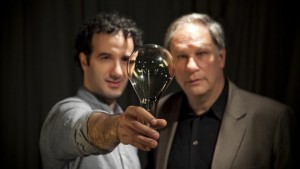 Radiolab: Much like This American Life, Radiolab established much of the lingua franca behind narrative radio. And with its rapid-fire editing, its commitment to layered sound texture, its thoughtful consideration of largely science-oriented topics, and the strange chemistry between hosts Robert Krulwich and Jad Abumrad, Radiolab remains an always reliable and always thoughtful staple in investigating such topics as the touch-and-go evolution of Candid Camera, the Cuban punk rock scene, and the creepy manipulation of human behavior by Facebook engineers. (Link)
Radiolab: Much like This American Life, Radiolab established much of the lingua franca behind narrative radio. And with its rapid-fire editing, its commitment to layered sound texture, its thoughtful consideration of largely science-oriented topics, and the strange chemistry between hosts Robert Krulwich and Jad Abumrad, Radiolab remains an always reliable and always thoughtful staple in investigating such topics as the touch-and-go evolution of Candid Camera, the Cuban punk rock scene, and the creepy manipulation of human behavior by Facebook engineers. (Link)
 Relic Radio Sci-Fi (Link), Relic Radio Thrillers (Link), and Strange Tales (Old Time Radio): (Link): If you want to get up to speed on old time radio (or are interested in exploring the Robert Johnson-like roots of OTR), these three podcasts are the ones you need to listen to. In addition to featuring old stalwarts like Suspense, X Minus One, Quiet Please in active rotation, there are also slightly more obscure shows like The Creaking Door, Inner Sanctum, and The Zero Hour included in the bunch. Old time radio has a rich history extending many decades, one inexplicably overlooked as we enter a putative “golden age of podcasting.” And once you begin to pick up on the theatrical cadences and dramatic energy that these old shows had to offer, which is hardly confined to the piqued cliches that some attempting to follow in radio drama’s footsteps are regrettably mimicking, you’ll start to get a sense of what podcasting may be capable of as it continues to blossom.
Relic Radio Sci-Fi (Link), Relic Radio Thrillers (Link), and Strange Tales (Old Time Radio): (Link): If you want to get up to speed on old time radio (or are interested in exploring the Robert Johnson-like roots of OTR), these three podcasts are the ones you need to listen to. In addition to featuring old stalwarts like Suspense, X Minus One, Quiet Please in active rotation, there are also slightly more obscure shows like The Creaking Door, Inner Sanctum, and The Zero Hour included in the bunch. Old time radio has a rich history extending many decades, one inexplicably overlooked as we enter a putative “golden age of podcasting.” And once you begin to pick up on the theatrical cadences and dramatic energy that these old shows had to offer, which is hardly confined to the piqued cliches that some attempting to follow in radio drama’s footsteps are regrettably mimicking, you’ll start to get a sense of what podcasting may be capable of as it continues to blossom.
 Reply All: Okay, I have to confess that there’s something ineluctably techbro and tendentious about Alex Goldman and PJ Vogt that can be very off-putting, even though this duo has started to actively pursue viewpoints well outside of their “Wassup?” default setting. The pair isn’t always fair to their subjects, often jumping on listeners to condemn a particular point of view before having a chance to take it in, and can be needlessly self-congratulatory at times (the obnoxious “Yes Yes No” segments, in particular, have got to stop). So why am I recommending it? Because Reply All is still a worthwhile contribution to tech-related podcasts, especially when the stories pursue some seemingly pedantic but surprisingly rich subject such as how the man who invented pop-up ads lives with his ethical legacy or the remorseless and obdurate vigilante behind Ripoff Report. When Reply All allows its subjects to speak and tell their stories, it offers interesting insights into how technology summons human obsession, for better or worse. So I’m not ready to give up on Reply All anytime soon, even if I wish that its two hosts would stop gazing at their navels and look more outside of themselves. (Link)
Reply All: Okay, I have to confess that there’s something ineluctably techbro and tendentious about Alex Goldman and PJ Vogt that can be very off-putting, even though this duo has started to actively pursue viewpoints well outside of their “Wassup?” default setting. The pair isn’t always fair to their subjects, often jumping on listeners to condemn a particular point of view before having a chance to take it in, and can be needlessly self-congratulatory at times (the obnoxious “Yes Yes No” segments, in particular, have got to stop). So why am I recommending it? Because Reply All is still a worthwhile contribution to tech-related podcasts, especially when the stories pursue some seemingly pedantic but surprisingly rich subject such as how the man who invented pop-up ads lives with his ethical legacy or the remorseless and obdurate vigilante behind Ripoff Report. When Reply All allows its subjects to speak and tell their stories, it offers interesting insights into how technology summons human obsession, for better or worse. So I’m not ready to give up on Reply All anytime soon, even if I wish that its two hosts would stop gazing at their navels and look more outside of themselves. (Link)
 Ronna & Beverly: This podcast is so good that it is often hard to believe that this show, ostensibly helmed by two fiftysomething Jewish women from Boston, is actually the work of two extremely brilliant improvisers named Jessica Chaffin and Jamie Denbo. The two stay resolutely and hilariously in character as they interview comedy and TV celebrities for more than an hour, probing noisily into a guest’s love life, bringing up Israel, dishing up celebrity gossips, contemplating the size of Jon Hamm’s penis, offering many politically incorrect observations, and torturing their sound engineer Sam about what he does during his outside time. When guests go along for the ride, such as this terrific conversation with Stephen Toblowsky, Ronna and Beverly excels at levels matched only by The Colbert Report. (Link)
Ronna & Beverly: This podcast is so good that it is often hard to believe that this show, ostensibly helmed by two fiftysomething Jewish women from Boston, is actually the work of two extremely brilliant improvisers named Jessica Chaffin and Jamie Denbo. The two stay resolutely and hilariously in character as they interview comedy and TV celebrities for more than an hour, probing noisily into a guest’s love life, bringing up Israel, dishing up celebrity gossips, contemplating the size of Jon Hamm’s penis, offering many politically incorrect observations, and torturing their sound engineer Sam about what he does during his outside time. When guests go along for the ride, such as this terrific conversation with Stephen Toblowsky, Ronna and Beverly excels at levels matched only by The Colbert Report. (Link)
 Serendipity: If the future of radio drama is ripe with possibility, then Ann Heppermann and Martin Johnson are determined to burst through its natural limits with Serendipity, a recently introduced podcast that counts five episodes so far of varying experimental range. The debut episode, “Every Heart Has a Limited Amount of Heartbeats,” established an uncannily vivacious standard of field recording, intense incantations, and aggressive collage that immediately seized my ears and refused to let go. And while subsequent episodes have offered slightly more traditional fare, there remains great poetic promise in this program to back up Heppermann’s bold call to push storytelling boundaries. (A good introduction to Serendipity‘s ethos can be found through this Radio Drama Revival episode, which includes an interviewer with Ann Heppermann.) (Link)
Serendipity: If the future of radio drama is ripe with possibility, then Ann Heppermann and Martin Johnson are determined to burst through its natural limits with Serendipity, a recently introduced podcast that counts five episodes so far of varying experimental range. The debut episode, “Every Heart Has a Limited Amount of Heartbeats,” established an uncannily vivacious standard of field recording, intense incantations, and aggressive collage that immediately seized my ears and refused to let go. And while subsequent episodes have offered slightly more traditional fare, there remains great poetic promise in this program to back up Heppermann’s bold call to push storytelling boundaries. (A good introduction to Serendipity‘s ethos can be found through this Radio Drama Revival episode, which includes an interviewer with Ann Heppermann.) (Link)
 Serial: There’s been some debate over whether Serial‘s second season can match the first (with many gossipy ADD types abandoning Serial for the true crime Netflix sensation, Making a Murderer), or whether the current story of Bowe Bergdahl isn’t so much the work of Sarah Koenig, as it is Mark Boal putting together a movie with crass opportunism. But Koenig’s reporting is not to be gainsaid so easy. She has spoken directly with the Taliban and, while Bergdahl may not be as sympathetic a subject as Adnan Syed, Serial is still pursuing very important questions on how someone condemned for treason and cowardice should be understood through his own constantly shifting motivations, which has caused me to listen to each episode at least twice. (Link)
Serial: There’s been some debate over whether Serial‘s second season can match the first (with many gossipy ADD types abandoning Serial for the true crime Netflix sensation, Making a Murderer), or whether the current story of Bowe Bergdahl isn’t so much the work of Sarah Koenig, as it is Mark Boal putting together a movie with crass opportunism. But Koenig’s reporting is not to be gainsaid so easy. She has spoken directly with the Taliban and, while Bergdahl may not be as sympathetic a subject as Adnan Syed, Serial is still pursuing very important questions on how someone condemned for treason and cowardice should be understood through his own constantly shifting motivations, which has caused me to listen to each episode at least twice. (Link)
 Seriously…: This is a recently retooled version of several BBC radio documentary feeds, which appears to be the Beeb’s effort to attract younger listeners. There’s less of the hardcore reporting behind Assignment and more documentaries about video games and the Whole Earth Catalog. But if you listen to both this feed and the Documentaries BBC World Service feed, you should be able to listen to a well-rounded series of offerings from across the pond. And you’ll need to. Because the BBC only allows you to download these programs for a month before closing the gates for good. (Link)
Seriously…: This is a recently retooled version of several BBC radio documentary feeds, which appears to be the Beeb’s effort to attract younger listeners. There’s less of the hardcore reporting behind Assignment and more documentaries about video games and the Whole Earth Catalog. But if you listen to both this feed and the Documentaries BBC World Service feed, you should be able to listen to a well-rounded series of offerings from across the pond. And you’ll need to. Because the BBC only allows you to download these programs for a month before closing the gates for good. (Link)
 Song Exploder: The setup is simple: find a greatly revered song or piece of music, tear it apart, get the composer or the musicians to talk about it (often producing demos and, in one recent case, a crude voice memo recorded into a phone), and discover the often serendipitous creative process behind some of the more rocking tunes circulating the present cultural clime. The show has recently ventured into the stories behind soundtracks as well, with Harry Gregson-Williams relaying how he got signed on to score The Martian. One does wonder how long this formula will last or whether Song Exploder may now be angling itself to be less about breaking down music and more of a territory manipulated by savvy publicists. But for now, Song Exploder remains a solid sui generis podcast. (Link)
Song Exploder: The setup is simple: find a greatly revered song or piece of music, tear it apart, get the composer or the musicians to talk about it (often producing demos and, in one recent case, a crude voice memo recorded into a phone), and discover the often serendipitous creative process behind some of the more rocking tunes circulating the present cultural clime. The show has recently ventured into the stories behind soundtracks as well, with Harry Gregson-Williams relaying how he got signed on to score The Martian. One does wonder how long this formula will last or whether Song Exploder may now be angling itself to be less about breaking down music and more of a territory manipulated by savvy publicists. But for now, Song Exploder remains a solid sui generis podcast. (Link)
 Spark: Nora Young is a highly energetic Canadian whose voice sounds unnervingly similar to someone I once dated and no longer want to have anything to do with. But these are my hangups, not Young’s. And I’d be foolish and pusillanimous to condemn an extremely worthwhile offering of Canadian culture simply because of an alarming euphony. Young’s smart and vivacious meditations on technology often tackle heavy-hitting issues such as the casual way that couples invade each other’s privacy, surge pricing, and the ever present problem of time management. And in a crowded field of tech podcasts, Young’s weekly dispatches prove to be winning thoughtful epistles. (Link)
Spark: Nora Young is a highly energetic Canadian whose voice sounds unnervingly similar to someone I once dated and no longer want to have anything to do with. But these are my hangups, not Young’s. And I’d be foolish and pusillanimous to condemn an extremely worthwhile offering of Canadian culture simply because of an alarming euphony. Young’s smart and vivacious meditations on technology often tackle heavy-hitting issues such as the casual way that couples invade each other’s privacy, surge pricing, and the ever present problem of time management. And in a crowded field of tech podcasts, Young’s weekly dispatches prove to be winning thoughtful epistles. (Link)
 The Sporkful: This recommendation comes with a caveat: host Dan Pashman has a a rather relentless laugh. Pashman laughs at everything: his jokes, a serious situation, an awkward situation. You get the sense that he sometimes laughs for the sake of laughing, that he would laugh unknowingly at a funeral or when doing taxes. It’s an alarming laugh. We all know some guy like Dan Pashman who laughs at all times, who makes us wonder if the laugh is sincere or some troubling automatic impulse that may require therapy. The good news is that, after ten episodes of being suspicious of Pashman’s laugh, I did finally come around to digging his show and accepting his laugh. Pashman mitigates against his tittering by not being pretentious (even though his laugh, as we have established, is highly suspect). He is a lover of all food, even if he is often very wrong about it (such as believing the hot dog to be a sandwich), and is curious and mindful enough to perform such sui generis investigations such as sandwich gender imbalance and what it is like to dine out in a wheelchair. The strange and perhaps truly laudable quality here is that, for all of these progressive considerations, Pashman is never sanctimonious about it. But he does have the laugh, which is now too deeply ingrained within Pashman to be remedied. But maybe that laugh is the way for all of us to better appreciate food. (Link)
The Sporkful: This recommendation comes with a caveat: host Dan Pashman has a a rather relentless laugh. Pashman laughs at everything: his jokes, a serious situation, an awkward situation. You get the sense that he sometimes laughs for the sake of laughing, that he would laugh unknowingly at a funeral or when doing taxes. It’s an alarming laugh. We all know some guy like Dan Pashman who laughs at all times, who makes us wonder if the laugh is sincere or some troubling automatic impulse that may require therapy. The good news is that, after ten episodes of being suspicious of Pashman’s laugh, I did finally come around to digging his show and accepting his laugh. Pashman mitigates against his tittering by not being pretentious (even though his laugh, as we have established, is highly suspect). He is a lover of all food, even if he is often very wrong about it (such as believing the hot dog to be a sandwich), and is curious and mindful enough to perform such sui generis investigations such as sandwich gender imbalance and what it is like to dine out in a wheelchair. The strange and perhaps truly laudable quality here is that, for all of these progressive considerations, Pashman is never sanctimonious about it. But he does have the laugh, which is now too deeply ingrained within Pashman to be remedied. But maybe that laugh is the way for all of us to better appreciate food. (Link)
 Strangers: I first learned of Lea Thau after I stumbled upon her remarkable, must-listen, soul-baring “Love Hurts” series (1 2 3 4), in which Thau documented her efforts to find romance in stunningly honest detail: interviewing the men who rejected her, confessing her loneliness and her weaknesses, fiercely analyzing why she has stayed single and even subjecting herself to a questionable relationship expert. It was stunning and terribly brave radio that anyone in a place of loneliness and hurt might want to listen to. And this is, of course, what makes Strangers such an incredible program. The subjects, whether they be Thau or somebody else, are free to confess their most naked and humiliating feelings (such as a teacher who went years without learning how to read) and Thau’s intimacy forces us to empathize with them. Listening to Strangers, one finds great strength in confronting human frailties. And it is this quality, among many others, that makes several episodes of Strangers among some of the finest personal narratives to be found online. (Link)
Strangers: I first learned of Lea Thau after I stumbled upon her remarkable, must-listen, soul-baring “Love Hurts” series (1 2 3 4), in which Thau documented her efforts to find romance in stunningly honest detail: interviewing the men who rejected her, confessing her loneliness and her weaknesses, fiercely analyzing why she has stayed single and even subjecting herself to a questionable relationship expert. It was stunning and terribly brave radio that anyone in a place of loneliness and hurt might want to listen to. And this is, of course, what makes Strangers such an incredible program. The subjects, whether they be Thau or somebody else, are free to confess their most naked and humiliating feelings (such as a teacher who went years without learning how to read) and Thau’s intimacy forces us to empathize with them. Listening to Strangers, one finds great strength in confronting human frailties. And it is this quality, among many others, that makes several episodes of Strangers among some of the finest personal narratives to be found online. (Link)
 Sword and Scale: On first listen, Sword and Scale might seem like a fairly sensationalist true crime show. But it’s far more than that. In exploring such intense topics as the 1978 Guyana mass suicide and the primitive human identity that we can’t shake, Sword and Scale willfully includes some of the most shocking and horrifying audio to buttress its viewpoint. But at its best, such as this investigation into media and gun violence, Sword and Scale succeeds in being an off-kilter, thoughtful podcast into our darkest qualities. The show does not shy away from anything (not even in discussing the human body’s deterioration) and, in so doing, shakes the listener out of a blinkered view to engage with difficult truths. Mike Boudet often narrates with an intensity somewhere between John Walsh and Arch Oboler, but it somehow strikes the perfect tone between theatrical drive and something oddly meaningful in the understanding. (Link)
Sword and Scale: On first listen, Sword and Scale might seem like a fairly sensationalist true crime show. But it’s far more than that. In exploring such intense topics as the 1978 Guyana mass suicide and the primitive human identity that we can’t shake, Sword and Scale willfully includes some of the most shocking and horrifying audio to buttress its viewpoint. But at its best, such as this investigation into media and gun violence, Sword and Scale succeeds in being an off-kilter, thoughtful podcast into our darkest qualities. The show does not shy away from anything (not even in discussing the human body’s deterioration) and, in so doing, shakes the listener out of a blinkered view to engage with difficult truths. Mike Boudet often narrates with an intensity somewhere between John Walsh and Arch Oboler, but it somehow strikes the perfect tone between theatrical drive and something oddly meaningful in the understanding. (Link)
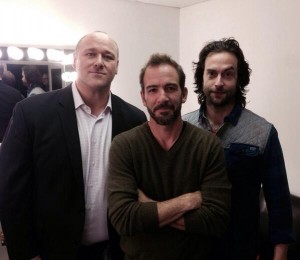 Ten Minute Podcast: Will Sasso, Bryan Callan, and Chris D’Elia are reliably silly men for this goofy podcast, which features such dependable regular characters as washed up standup comedian David Greco, the warmly puglistic Everybody’s Dad, and Skype sessions with people who may or may not be bona-fide listeners. And it’s only ten minutes long, which means that even a flailing installment of this show doesn’t overstay its welcome too long. While the trio doesn’t show up together as frequently as they used to due to industrious show business careers, and the show is now on some kind of odd hiatus, I have a feeling that the show is merely regrouping for some newfound silly stage where it will surprise itself and its audience. (Link)
Ten Minute Podcast: Will Sasso, Bryan Callan, and Chris D’Elia are reliably silly men for this goofy podcast, which features such dependable regular characters as washed up standup comedian David Greco, the warmly puglistic Everybody’s Dad, and Skype sessions with people who may or may not be bona-fide listeners. And it’s only ten minutes long, which means that even a flailing installment of this show doesn’t overstay its welcome too long. While the trio doesn’t show up together as frequently as they used to due to industrious show business careers, and the show is now on some kind of odd hiatus, I have a feeling that the show is merely regrouping for some newfound silly stage where it will surprise itself and its audience. (Link)
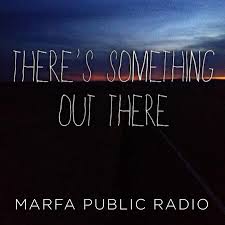 There’s Something Out There: Only five episodes of this fascinating podcast have been produced so far and one hopes that this isn’t the end. Because this is one of the best podcasts out there that attempts to wrestle with the wholly inexplicable: the incidents in life that one can’t quite explain, that often entail coming to spiritual or religious conclusions, but that all of us must contend with as human beings. With top-notch production value and something oddly journalistic in the way that the narratives are told, There’s Something Out There negotiates a smart balance between the factitious and the factual for which more podcasts, striving for authenticity, should take heed. (Link)
There’s Something Out There: Only five episodes of this fascinating podcast have been produced so far and one hopes that this isn’t the end. Because this is one of the best podcasts out there that attempts to wrestle with the wholly inexplicable: the incidents in life that one can’t quite explain, that often entail coming to spiritual or religious conclusions, but that all of us must contend with as human beings. With top-notch production value and something oddly journalistic in the way that the narratives are told, There’s Something Out There negotiates a smart balance between the factitious and the factual for which more podcasts, striving for authenticity, should take heed. (Link)
 Thinking Allowed: When I first started listening to Thinking Allowed a few years ago, I was initially skeptical due to the apparent Anglophonic pomp and circumstance behind Laurie Taylor’s voice. But I’m glad I stuck it out with this extremely sharp and worthwhile program, which profiles sociology and ethnography in a breezy manner. (Link)
Thinking Allowed: When I first started listening to Thinking Allowed a few years ago, I was initially skeptical due to the apparent Anglophonic pomp and circumstance behind Laurie Taylor’s voice. But I’m glad I stuck it out with this extremely sharp and worthwhile program, which profiles sociology and ethnography in a breezy manner. (Link)
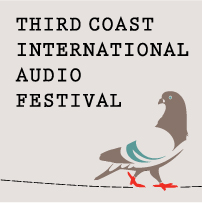 Third Coast International Audio Festival: Think of this as the nonfiction counterpart to Radio Drama Revival, whereby host Gwen Macsai and her team of dependable curators scour radio and podcasts to find the most moving and probing documentaries for these thematic programs. The show is quite happy to single out specific producers, such as formidable music documentary producer Alan Hall, whose moving portraits of Jeff Buckley and Elly Stone recently led me down rabbit holes that resulted in a rambunctious email thread with two friends over whether Stone was quite possibly the world’s most sensitive singer of all time. The regular podcast, Re: Sound, is probably responsible for me discovering more than a handful of the podcasts that are on this list. And there is no better showcase that I know of for some of the exciting voices flexing their talents in podcasting. (Link)
Third Coast International Audio Festival: Think of this as the nonfiction counterpart to Radio Drama Revival, whereby host Gwen Macsai and her team of dependable curators scour radio and podcasts to find the most moving and probing documentaries for these thematic programs. The show is quite happy to single out specific producers, such as formidable music documentary producer Alan Hall, whose moving portraits of Jeff Buckley and Elly Stone recently led me down rabbit holes that resulted in a rambunctious email thread with two friends over whether Stone was quite possibly the world’s most sensitive singer of all time. The regular podcast, Re: Sound, is probably responsible for me discovering more than a handful of the podcasts that are on this list. And there is no better showcase that I know of for some of the exciting voices flexing their talents in podcasting. (Link)
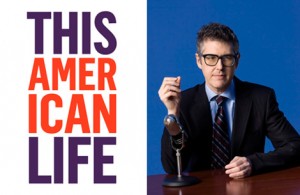 This American Life: Can Ira Glass be uptight, somewhat foolish, a little stiff, too reliant on the same music cues we’ve been hearing for more than a decade, and more than a bit condescending after twenty years? Absolutely. But he’s not to be discounted. Every narrative podcast in existence owes something to the way in which This American Life established many of the ground rules. And the show’s thematic approach still shows great resilience in chronicling the human, such as a recent collection of stories about people combating their fears, a wonderful investigation into what people are willing to do for love, and a rather marvelous Zoe Chase investigation into how fast food is named. Sometimes, Glass can be remarkably stilted in the execution of a thrilling story (such as this take on the Rabin assassination). But This American Life, for the most part, still delivers. (Link)
This American Life: Can Ira Glass be uptight, somewhat foolish, a little stiff, too reliant on the same music cues we’ve been hearing for more than a decade, and more than a bit condescending after twenty years? Absolutely. But he’s not to be discounted. Every narrative podcast in existence owes something to the way in which This American Life established many of the ground rules. And the show’s thematic approach still shows great resilience in chronicling the human, such as a recent collection of stories about people combating their fears, a wonderful investigation into what people are willing to do for love, and a rather marvelous Zoe Chase investigation into how fast food is named. Sometimes, Glass can be remarkably stilted in the execution of a thrilling story (such as this take on the Rabin assassination). But This American Life, for the most part, still delivers. (Link)
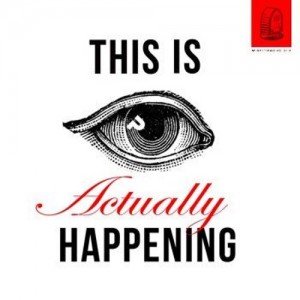 This is Actually Happening: The conceptual thrust behind Whit Missildine’s long-running program involves taking a seemingly unlikely human experience (living as a fake priest marrying people in Japan, a deadly shooting from a crazed shirtless man as a woman is driving in the middle of nowhere) and exploring every conceivable angle of what it was like to experience it without intruding upon the person’s story. Missildine layers the stories with moody music, but what I suspect he has truly set out to do is make the strangest stories more palpable so that we can broaden our notion of what existence is truly about. We have all experienced improbable adventures, but This is Actually Happening demands that we take these seriously. You leave an episode of Missildine’s program often in a strange and profound fog. That’s how good this show is at allowing another person’s intimate details to sneak up on you. It’s almost as if the listener is a kind of vicarious therapist unable to steer the details, but then that’s part of the point. (Link)
This is Actually Happening: The conceptual thrust behind Whit Missildine’s long-running program involves taking a seemingly unlikely human experience (living as a fake priest marrying people in Japan, a deadly shooting from a crazed shirtless man as a woman is driving in the middle of nowhere) and exploring every conceivable angle of what it was like to experience it without intruding upon the person’s story. Missildine layers the stories with moody music, but what I suspect he has truly set out to do is make the strangest stories more palpable so that we can broaden our notion of what existence is truly about. We have all experienced improbable adventures, but This is Actually Happening demands that we take these seriously. You leave an episode of Missildine’s program often in a strange and profound fog. That’s how good this show is at allowing another person’s intimate details to sneak up on you. It’s almost as if the listener is a kind of vicarious therapist unable to steer the details, but then that’s part of the point. (Link)
 To the Best of Our Knowledge: Upon the first few listens, To the Best of Our Knowledge may seem like your typical topical compendium show: a casual rundown of notable names and fine minds offering the greatest cerebral hits for a public audience. But there is something quite subtly daring about Anne Strainchamps and Steve Paulson’s approach that has transformed me into a big fan. A recent hour devoted to the human voice featured several compelling segments, ranging from an African-American actor contending with casting agents telling him that he needed to be “more urban” to the way in which subtle patriarchal forces were singling out vocal fry to police the way that women are “supposed” to speak. To the Best of Our Knowledge also aired a particularly gutsy and thoughtful series on death over for several weeks, something that you really don’t hear much at all on a syndicated public radio show, that demanded its listeners to come to terms with mortality and its impact upon our lives. So Anne Strainchamps may seem to be a polite, urbane, and crowd-pleasing radio host. But as you come to listen to her, you begin to realize that she has a comforting dark streak and a wry sense of humor. Also, any show that allows punk historian Legs McNeil to get really pissed off on-air is good in my book. (Link)
To the Best of Our Knowledge: Upon the first few listens, To the Best of Our Knowledge may seem like your typical topical compendium show: a casual rundown of notable names and fine minds offering the greatest cerebral hits for a public audience. But there is something quite subtly daring about Anne Strainchamps and Steve Paulson’s approach that has transformed me into a big fan. A recent hour devoted to the human voice featured several compelling segments, ranging from an African-American actor contending with casting agents telling him that he needed to be “more urban” to the way in which subtle patriarchal forces were singling out vocal fry to police the way that women are “supposed” to speak. To the Best of Our Knowledge also aired a particularly gutsy and thoughtful series on death over for several weeks, something that you really don’t hear much at all on a syndicated public radio show, that demanded its listeners to come to terms with mortality and its impact upon our lives. So Anne Strainchamps may seem to be a polite, urbane, and crowd-pleasing radio host. But as you come to listen to her, you begin to realize that she has a comforting dark streak and a wry sense of humor. Also, any show that allows punk historian Legs McNeil to get really pissed off on-air is good in my book. (Link)
 The Truth: Spearheaded by the redoubtable Jonathan Mitchell, with considerable assists from such unsung improvisational wunderkinds as Louis Kornfeld and other dependable contributors from the Magnet Theater, The Truth is putting out some of the finest radio drama today. These are strange stories for our contemporary age, tapping into such moral quandaries as parental displacement, a delightfully satirical investigation into leisure, and an especially creepy story about damnation in the underworld. The Truth works as well as it does because it is committed to meaningful, somewhat soul-searching performances embedded within a calm and exacting atmosphere that is equally committed well-timed silences and faint rustlings. This gives The Truth a peculiar tension between something faintly comic and faintly fierce, feeling, at times, like a soundscape inspired from a David Lynch film. <(Link)
The Truth: Spearheaded by the redoubtable Jonathan Mitchell, with considerable assists from such unsung improvisational wunderkinds as Louis Kornfeld and other dependable contributors from the Magnet Theater, The Truth is putting out some of the finest radio drama today. These are strange stories for our contemporary age, tapping into such moral quandaries as parental displacement, a delightfully satirical investigation into leisure, and an especially creepy story about damnation in the underworld. The Truth works as well as it does because it is committed to meaningful, somewhat soul-searching performances embedded within a calm and exacting atmosphere that is equally committed well-timed silences and faint rustlings. This gives The Truth a peculiar tension between something faintly comic and faintly fierce, feeling, at times, like a soundscape inspired from a David Lynch film. <(Link)
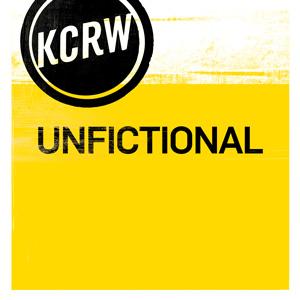 Unfictional: Whether it’s a woman who suffers from Cotard’s delusion or a man who unknowingly lived across the street from Whitey Bulger, Bob Carlson’s long-running forum for personal storytelling continues to deliver some truly touching tales, when it isn’t devoting one of its solid half hours to legendary radio artist Joe Frank or its annual 24 Hour Radio Race challenge, whereby producers are enlisted to write, record, and edit a story in less than a day. (Link)
Unfictional: Whether it’s a woman who suffers from Cotard’s delusion or a man who unknowingly lived across the street from Whitey Bulger, Bob Carlson’s long-running forum for personal storytelling continues to deliver some truly touching tales, when it isn’t devoting one of its solid half hours to legendary radio artist Joe Frank or its annual 24 Hour Radio Race challenge, whereby producers are enlisted to write, record, and edit a story in less than a day. (Link)
 The Urbanist: There is nearly nothing on the airwaves that I can find that explores city-related issues with such rigor and international reach. Think of The Urbanist as a radio counterpart to CityLab, where issues ranging from neglected delivery drivers to urbanistas are explored in rapid-fire bursts in so many locations that one wonders if The Urbanist has somehow enlisted a massive army of regular contributors ready to be activated into action upon one sinister call from host Andrew Tuck. (Link)
The Urbanist: There is nearly nothing on the airwaves that I can find that explores city-related issues with such rigor and international reach. Think of The Urbanist as a radio counterpart to CityLab, where issues ranging from neglected delivery drivers to urbanistas are explored in rapid-fire bursts in so many locations that one wonders if The Urbanist has somehow enlisted a massive army of regular contributors ready to be activated into action upon one sinister call from host Andrew Tuck. (Link)
 The Virtual Memories Show: When people ask me where they can go to find thoughtful discussions on literature after they learn that my own podcast, The Bat Segundo Show, is no longer in production, I send them to Gil Roth’s loquacious conversations with top-notch artists and thinkers. Roth has this strange ability to get someone to talk thoughtfully for a good six minutes based on one question. And when I met Roth for the first time at a Brooklyn coffeehouse, I realized that this was something he seems to be born with. For he managed to get me to ramble at length for six minutes in a way that I certainly never intended to and that I usually don’t. There’s always a moment near the end of Roth’s show where there is a sudden beat, followed by the question “So what are you reading?” phrased in an intense interrogative manner that recalls the Senate investigating the Watergate scandal, illustrating his real purpose: to keep curiosity and thoughtful wonder about books that fewer people read alive. It’s a game I’ve abandoned in radio, for life is too short to pamper the petulant infants of the literary world when there are real readers you can invite to your extravagant dinner parties, but one that I’m glad Roth is still keeping alive. (Link)
The Virtual Memories Show: When people ask me where they can go to find thoughtful discussions on literature after they learn that my own podcast, The Bat Segundo Show, is no longer in production, I send them to Gil Roth’s loquacious conversations with top-notch artists and thinkers. Roth has this strange ability to get someone to talk thoughtfully for a good six minutes based on one question. And when I met Roth for the first time at a Brooklyn coffeehouse, I realized that this was something he seems to be born with. For he managed to get me to ramble at length for six minutes in a way that I certainly never intended to and that I usually don’t. There’s always a moment near the end of Roth’s show where there is a sudden beat, followed by the question “So what are you reading?” phrased in an intense interrogative manner that recalls the Senate investigating the Watergate scandal, illustrating his real purpose: to keep curiosity and thoughtful wonder about books that fewer people read alive. It’s a game I’ve abandoned in radio, for life is too short to pamper the petulant infants of the literary world when there are real readers you can invite to your extravagant dinner parties, but one that I’m glad Roth is still keeping alive. (Link)
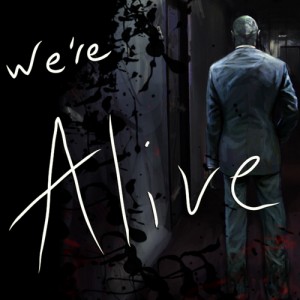 We’re Alive: This stirring zombie apocalypse drama packs as many characters into its unfolding story as The Walking Dead and has built up a massive narrative of more than 100 episodes that it is quite easy to get pleasantly gripped by. We listen to the characters as they face resource shortages and lose loved ones, but We’re Alive, through a settlement erected at an apartment complex, appears equally more committed to exploring parallels between our present world and the dystopian path not taken. (Link)
We’re Alive: This stirring zombie apocalypse drama packs as many characters into its unfolding story as The Walking Dead and has built up a massive narrative of more than 100 episodes that it is quite easy to get pleasantly gripped by. We listen to the characters as they face resource shortages and lose loved ones, but We’re Alive, through a settlement erected at an apartment complex, appears equally more committed to exploring parallels between our present world and the dystopian path not taken. (Link)
 The White Whale: Anyone fond of baroque, somewhat experimental radio drama should be listening to the crazed efforts of CyNar Pictures, which features a strange tension between the making of art and the discussion of art erupts with every installment of this gargantuan potpourri of spoken word, the rambling conversations of The Yokai Trilogy (almost a DVD commentary without end), and whatever other whims erupt from these mysterious producers. who have been at work on this possibly aimless, possibly highly purposeful project for a good year. There is a ghost story of some sort beneath all this meta banter, but it’s up to the listener to determine whether the specter is something chased through the act of telling stories or talking about storytelling. (Link)
The White Whale: Anyone fond of baroque, somewhat experimental radio drama should be listening to the crazed efforts of CyNar Pictures, which features a strange tension between the making of art and the discussion of art erupts with every installment of this gargantuan potpourri of spoken word, the rambling conversations of The Yokai Trilogy (almost a DVD commentary without end), and whatever other whims erupt from these mysterious producers. who have been at work on this possibly aimless, possibly highly purposeful project for a good year. There is a ghost story of some sort beneath all this meta banter, but it’s up to the listener to determine whether the specter is something chased through the act of telling stories or talking about storytelling. (Link)
 WideShut Webcast: I first learned of WideShut through an episode of Sword and Scale, when the two podcasts collaborated on a gripping story about the Hampstead Satanic cult, a truly alarming and far from resolved case of sex abuse and false allegations that should cause pause for anyone in our age of outrage. Political conspiracy is Keelan Balderson’s stock in trade and there are fascinating questions here on how media shapes our notion of evil and how we judge other people. (Link)
WideShut Webcast: I first learned of WideShut through an episode of Sword and Scale, when the two podcasts collaborated on a gripping story about the Hampstead Satanic cult, a truly alarming and far from resolved case of sex abuse and false allegations that should cause pause for anyone in our age of outrage. Political conspiracy is Keelan Balderson’s stock in trade and there are fascinating questions here on how media shapes our notion of evil and how we judge other people. (Link)
 The World in Words: This pithy show, unrolled in twenty minute installments, investigates language, but is, like any good topical podcast, very much invested in the larger world. A recent two part investigation into fake accents in pop music, ushered in by this worthwhile effort to contend with the pop punk sneer, proved especially perspicacious, as did these insights into how ASL is tinged with a Philly dialect. For anyone obsessed with such pedantics (and I’m afraid I shall be to my last dying day), The World in Words is a casually probing and invaluable entry into the way we communicate and its impact upon all around us. (Link)
The World in Words: This pithy show, unrolled in twenty minute installments, investigates language, but is, like any good topical podcast, very much invested in the larger world. A recent two part investigation into fake accents in pop music, ushered in by this worthwhile effort to contend with the pop punk sneer, proved especially perspicacious, as did these insights into how ASL is tinged with a Philly dialect. For anyone obsessed with such pedantics (and I’m afraid I shall be to my last dying day), The World in Words is a casually probing and invaluable entry into the way we communicate and its impact upon all around us. (Link)
 WTF with Marc Maron: Marc Maron has many gifts as an interviewer and as a comedian, but what he does so well with his highly entertaining show is the way that he gets at the root of fears and anxieties in himself and in his guests. It’s reflected in his longtime obsession with a Saturday Night Live audition with Lorne Michaels, one that he finally got closure on in November, and in the burgeoning empathy that has crept evermore into his lengthy introductions this year. Maron can be troubled and often angry, but what makes WTF such a wonderful listening experience isn’t just the way it documents the history of comedy and increasingly music (although this is often very interesting), but observing a man finally having the courage to mature late in life. Maron is deepening in ways he may not even know. And in its post-Lorne Michaels incarnation, WTF hasn’t finished growing by a long shot. (Link)
WTF with Marc Maron: Marc Maron has many gifts as an interviewer and as a comedian, but what he does so well with his highly entertaining show is the way that he gets at the root of fears and anxieties in himself and in his guests. It’s reflected in his longtime obsession with a Saturday Night Live audition with Lorne Michaels, one that he finally got closure on in November, and in the burgeoning empathy that has crept evermore into his lengthy introductions this year. Maron can be troubled and often angry, but what makes WTF such a wonderful listening experience isn’t just the way it documents the history of comedy and increasingly music (although this is often very interesting), but observing a man finally having the courage to mature late in life. Maron is deepening in ways he may not even know. And in its post-Lorne Michaels incarnation, WTF hasn’t finished growing by a long shot. (Link)
 Zoe Nightingale: Zoe Nightingale is one of the funniest, most courageous, and gloriously iconoclastic interviewers around, who secured my unshakable loyalty when she somehow stumbled onto a story that drew many strikingly original connections between animal rights, homelessness, and rigid ideology and in taking her family to Burning Man, where she made valiant efforts to expose them unapologetically to pansexual possibilities. There really aren’t too many podcasters willing to go there like this. There’s something charmingly liberating about Zoe Nightingale. She’s just dangerous enough to push us out of our comfort zones, yet still committed to the celebration of life, almost an Iris Murdoch on steroids. (Link)
Zoe Nightingale: Zoe Nightingale is one of the funniest, most courageous, and gloriously iconoclastic interviewers around, who secured my unshakable loyalty when she somehow stumbled onto a story that drew many strikingly original connections between animal rights, homelessness, and rigid ideology and in taking her family to Burning Man, where she made valiant efforts to expose them unapologetically to pansexual possibilities. There really aren’t too many podcasters willing to go there like this. There’s something charmingly liberating about Zoe Nightingale. She’s just dangerous enough to push us out of our comfort zones, yet still committed to the celebration of life, almost an Iris Murdoch on steroids. (Link)

Just wanted to say how tickled and honored I am to be included in this list (Radio Drama Revival). Contemporary radio drama has felt like a bit of a country cousin to other audio arts, but it feels like our day is arriving and I appreciate hearing from listeners who really get what we’re trying to discuss and showcase in the show. Onward!
podcasts are awesome, my HDD contains about 13000 podcasts about Everything. it is like having a university in a small box, so much to think about.
thank you for adding some interesting sources……….
Great list guys! I keep hearing about The Pitch podcast. Need to check it out.